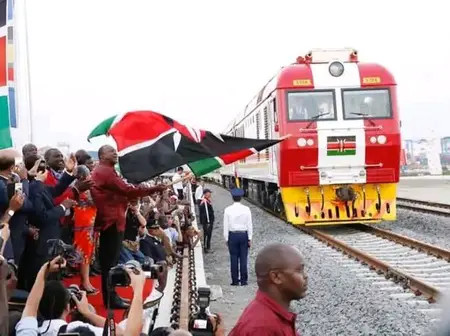Kenya Railways Corporation is still reeling from the effects of Sh50 billion loss, the highest among state corporations even as oversight authorities poke holes into the mystery surrounding daily collections made from Commuter Rail train services.
The Corporation is coming under tough scrutiny ahead of the multi-billion Railway City project that will be funded by the United Kingdom.
At the helm of the controversy-prone KR is Philp Mainga,a seasoned administrator serving as the Managing Director.
Mr. Mainga has battled a myriad of corruption allegations even as his tenure comes to an end in January 2026.
To date,KR struggles to shake off its debts, adding to Kenya’s ballooning problem of dealing with unaccounted wastage in public corporations.
In December,2024, a treasury report revealed that Kenya Railways made a Sh50 billion loss, the highest among state corporations for the 2023/2024 period.
An internal audit has raised yet another alarm, with the corporation at the risk of recording an additional Sh billion losses for the 2024/2025 financial year.
A red flag has also been raised on possible diversion of the daily collections remitted from the Commuter Train Services trains plying the Nairobi routes.
Last year, the corporation was slapped with a Sh3.5 billion penalty for defaulting on loans borrowed for the construction of the Standard Gauge Railway. This was against the backdrop of reports that funds set aside to clear part of the loans were diverted.
The penalty stemmed from unpaid and accumulated charges related to a loan from China Exim Bank, which the corporation failed to settle in time.
In a detailed report presented in Parliament, Auditor General Nancy Gathungu highlighted the financial mismanagement plaguing the state-owned corporation.
She issued an adverse opinion on Kenya Railways’ financial accounts as of June 30, 2024, citing the lack of proper controls and unsatisfactory explanations for the loan defaults.
It is emerging that Kenya Railways made no repayments to China Exim Bank during the year under review, resulting in the accumulation of Sh41 billion in outstanding loan repayments and penalties.
“Loan records revealed that the corporation incurred the penalties and interest due to non-settlement of the maturing obligations as and when they became due,” Gathungu said.
Further compounding the crisis, Gathungu noted that the corporation’s management did not provide any justification for failing to settle the loans.
“Management did not provide an explanation for this unsatisfactory matter. The effectiveness of controls in relation to the settlement of the on-lent loans could not be confirmed,” she said.
The audit also revealed that Kenya Railways’ revenue from its operations was insufficient to cover the maturing loan obligations, leading to additional penalties.
This financial shortfall drew attention to the ongoing mismanagement within the organisation, with the corporation now at risk of facing further financial and operational challenges.
The report also flagged several procurement irregularities within Kenya Railways, including the use of irregular tendering methods to acquire supplies.
During the review period, the corporation acquired Sh9 billion worth of supplies through direct or restricted tendering, which was deemed unjustifiable.

Leave a Reply